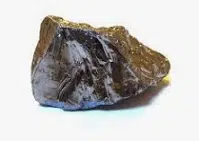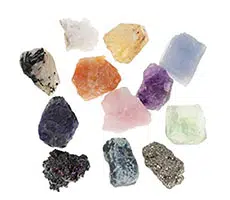 A mineral is an inorganic matter : it lacks organs for life. It can be found in the different layers of the Earth 's crust or even on the surface.
A mineral is an inorganic matter : it lacks organs for life. It can be found in the different layers of the Earth 's crust or even on the surface.
Unlike animals, plants, fungi and other living beings , minerals do not have life. This means that these substances, although they are of natural origin, are neither born nor die; They don't reproduce either.
There are more than 5,000 kinds of minerals and several dozen more are discovered every year. Although the distinctive features of minerals are often debated, it is generally considered that these elements must be able to be represented by a chemical formula and must be stable at room temperature (which is why they must be solid, although there are exceptions). The physical characteristics of minerals, on the other hand, are homogeneous .
Minerals are often confused with rocks . A rock is a material that can be made up of a mineral or a combination of them. That is why its chemical composition is variable, unlike what happens with minerals.
Luster , hardness and tenacity are some of the properties of minerals. According to its qualities, each mineral has a greater or lesser importance for human beings depending on how it is used.
Industrial minerals are those that man exploits on a large scale, using mining for extraction and treatment. Copper , iron , bauxite and diamond , among many others, are used in multiple areas and contexts.
It is estimated that a third of the world's population has a mineral and vitamin deficiency . This can lead to a large number of infectious diseases , and is largely due to incorrect diet. First of all, we must point out that all minerals are necessary, although we need some more than others. Below we review the most important ones for our health:
* Silicon : plays a very important role in the formation, reinforcement and elasticity of connective tissue, especially skin, nails and hair. On the other hand, it also helps to fix calcium in the bones and teeth, in addition to calming digestive problems;
* calcium : it is the most abundant mineral in our body and has many functions, among which the strengthening of bones and teeth and intervention in muscle contraction and blood clotting in case of injury stand out;
 * magnesium : it is one of the essential minerals. It collaborates in the formation of proteins , in the release of energy, in the regulation of body temperature and in the stabilization of bones. As if this were not enough, it is one of the agents that maintains blood pressure between values considered healthy;
* magnesium : it is one of the essential minerals. It collaborates in the formation of proteins , in the release of energy, in the regulation of body temperature and in the stabilization of bones. As if this were not enough, it is one of the agents that maintains blood pressure between values considered healthy;
* iron : we need it to live because it is part of the red blood cells that transport oxygen to the cells. It is also involved in obtaining certain enzymes that attack infections and vitamin A, among other substances;
* potassium : helps regulate other minerals and fluids inside and outside cells, in addition to regulating blood pressure and nerve impulses. Not getting enough potassium can lead to loss of appetite, weakness, and cramps;
* zinc : its presence in our body is essential for several hundred enzymes to function correctly. Other benefits are perceived in the healing of wounds, the sharpening of smell and taste, and the functioning of the immune system .
